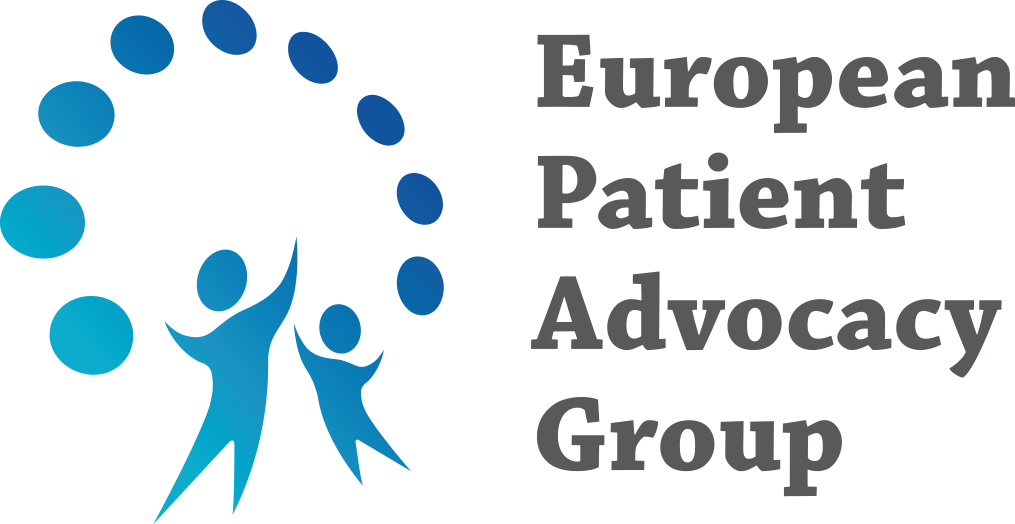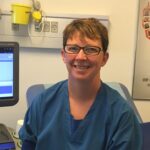The MSA Working Group, is built upon Multidisciplinary Centres of Excellence that are collaborating. The MSA-WG scope includes mainly Vascular Ehlers Danlos Syndrome. It will be enlarged to the other medium sized arteries diseases in the future
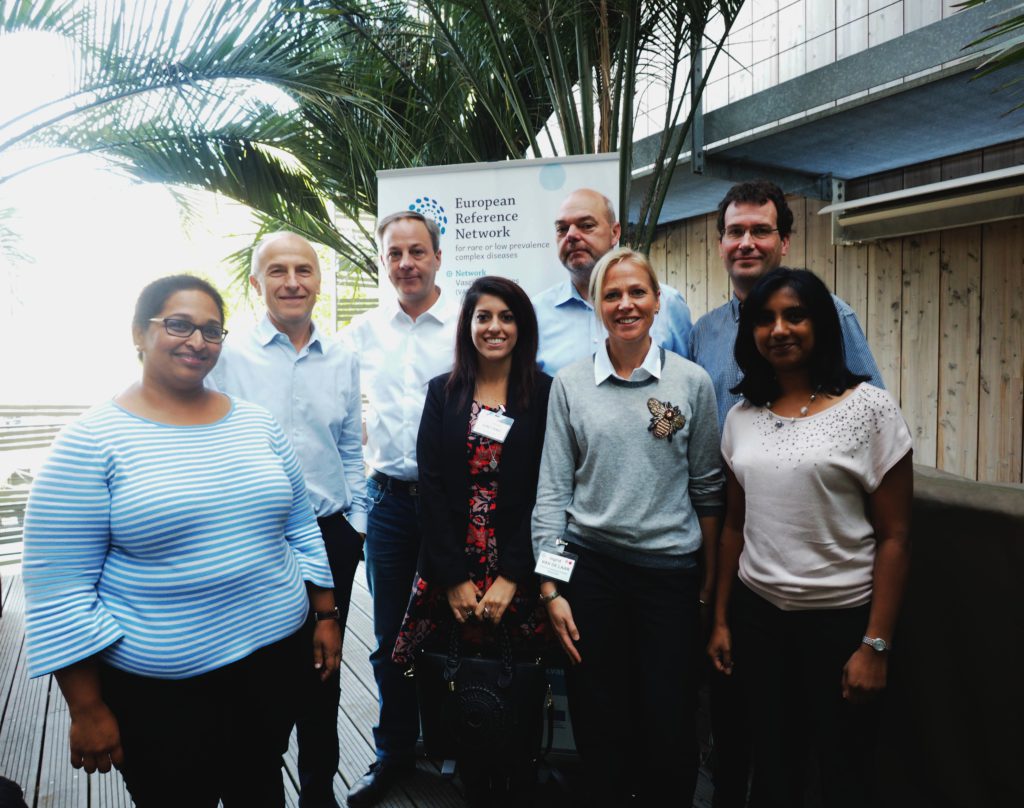

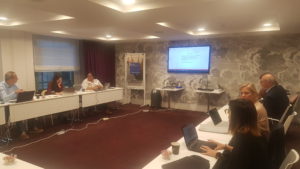
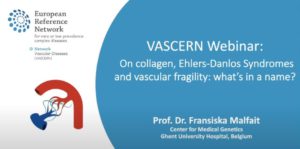
The Medium-Sized Arteries (MSA WG) is one of the five Rare Disease Working Groups (RDWGs) of VASCERN that specialize in a particular type/group of rare vascular disease(s).
The MSA-WG is chaired by Dr. Michael Frank, from the French Reference Centre for Rare Vascular Diseases, CRMR Rare Vascular Diseases, CHU Paris IdF Ouest – HEGP Hôpital Européen Georges Pompidou, in Paris, France and Co-Chaired by Dr. Fransiska Malfait from the Center of Medical Genetics at Ghent University Hospital, in Ghent, Belgium.
The MSA-WG cooperates with the European Patient Advocacy Group (ePAG), which is represented by ePAG Co-Chair for MSA, Juergen Grunert (Ehlers-Danlos-Initiative e.V.) and ePAG Deputy Co-Chair for MSA, Charissa Frank (Bindweefsel.be)
The MSA WG equally collaborates with the Ehlers-Danlos Society.
The main condition for this group is Vascular Ehlers Danlos Syndrome, which involves the medium sized arteries and has particular features: autosomal dominant inheritance with high penetrance but variable expression, early-onset of morbid complications (median age of first complications: 28 years), reduced life expectancy (around 55-60 years of age), various types of major complications: arterial but also digestive and uterine ruptures, which require specific training and medical experience (refs).
Other conditions that involve or affect the medium sized arteries include conditions such as:
Spontaneous Coronary Arterial dissections (SCAD)
Fibromuscular dysplasia
Vascular EDS
Given the rarity of the condition, outside a small number of specialist centres worldwide, few general physicians would have enough experience to manage this group of conditions. A small of number of studies from specialist centres that have collected longitudinal and cross sectional data has clearly indicated that systematic surveillance and management of these patients with early intervention is successful. There is no consensus for best practice in surveillance, medical intervention and surgical intervention mainly because of the rarity of the condition and difficulty in collaborative analysis of clinical data.
Improving diagnosis of this group of conditions and recommending appropriate management strategies would be the main aim of this thematic subgroup. Collation of larger group of data for natural history studies, biomarkers and development of clinical trials would fall under the research strategy of this thematic subgroup.
Bases for the estimated incidence and prevalence numbers: 500 Million inhabitants within European union with about 6 million newborns annually.
| Sub-thematic areas of expertise | Rare of complex disease(s) or condition(s) or highly specialized interventions | Code/ICD/Orphacode/Group of codes | Incidence (Number of cases/year) (in the EU) | Prevalence (in the EU) |
|---|---|---|---|---|
| MSA | Vascular Ehlers Danlos Syndrome (vEDS) | Q79.6; ORPHA286 | 60-120 | Suggested: 5000-10 000 |
HEALTHCARE PROVIDER (HCP) FULL MEMBERS

FRANCE
AP-HP, CHU Paris IdF Ouest, HEGP Hôpital Européen Georges Pompidou, Paris, France
VASCERN MSA European Reference Centre, Rare Vascular Diseases Reference Centre (CRMR)


Chair
Dr. Michael FRANK
Consultant Cardiologist

Prof. Tristan MIRAULT
Professor of Vascular Medicine

BELGIUM
Ghent University Hospital, Ghent, Belgium
VASCERN MSA European Reference Centre, Dept of Cardiology and Center for Medical Genetics


Pr. Julie De BACKER
Cardiologist and clinical geneticist

Co-Chair
Dr. Fransiska MALFAIT
Clinical geneticist
University Hospital of Antwerp, Antwerp, Belgium
VASCERN MSA European Reference Centre, Center of Medical Genetics


ePAG Co-Chair
Charissa FRANK

DENMARK

NETHERLANDS
Erasmus Medical Center, Rotterdam, The Netherlands
VASCERN MSA European Reference Centre, Department of Clinical Genetics and Cardiology


NORWAY

SPAIN
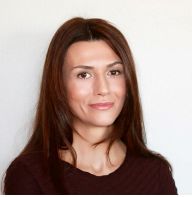
ePAG Deputy Co-Chair
Eva COLLADO

SWEDEN
AFFILIATED PARTNERS
There are 2 types of affiliated partners:
- Associated National Centres (mainly healthcare providers) for those ERNs where an EU Member State is not yet represented by a full member in the respective ERN. It establishes a link with one specific ERN.
- A National Coordination Hub which establishes at once a link with more than one Network in which a given Member State is neither represented by a full member nor by an Associated National Centre. National Coordination Hubs may especially represent a useful solution for those Member States with very small populations that need to establish such links with many ERNs at once.
For all documents related to Affiliated Partners see the Board Statement States page here
Associated National Centres

CYPRUS
The Cyprus Institute of Neurology and Genetics, Nicosia, Cyprus
Department of Cardiovascular Genetics & Laboratory of Forensic Genetics

National Coordination Hubs
Pills of Knowledge (PoK)
Pills of Knowledge (PoK) are the deliverable for VASCERN Work Package 4 on Pills of Knowledge, defined as short single video lessons (of approximately 3-5 minutes long) in which an expert talks about a specific topic that has been selected and validated by the Rare Disease Working Groups (RDWGs).
All Pills of Knowledge by the Medium-Sized Arteries Working Group (MSA-WG) can be found at the MSA-WG Playlist here
Unmet medical needs in vascular Ehlers-Danlos Syndrome (vEDS) – patients perspective
Created by Juergen Grunert (President Deutsche Ehlers-Danlos Initiative e.V., ePAG co-chair for the Medium Sized Arteries Working Group (MSA-WG)) and Charissa Frank (President bindweefsel.be, ePAG deputy co-chair for the Medium Sized Arteries Working Group (MSA-WG)).
In this Pill of Knowledge (PoK), our ePAG Co-Chair and Deputy Co-Chair for the Medium-Sized working group (MSA-WG) talk about vascular Ehlers-Danlos syndrome (vEDS) from a patient’s perspective. Their conversation covers both the unmet needs of vEDS patients and how the VASCERN MSA-WG is working to fulfill these needs (e.g. via educational materials, patient pathways and Do’s and Don’ts factsheets). It is directed towards patients, healthcare professionals and the general public in order to raise awareness for this rare vascular disease.
Video in English. Subtitles available in 5 European languages (English, French, German, Italian and Dutch).
Arterial Complications of Vascular Ehlers-Danlos Syndrome (vEDS)
Created by Dr. Michael Frank (Cardiologist, Rare Vascular Disease Reference Centre, Assistance Publique-Hôpitaux de Paris, Hôpital Européen – Georges Pompidou (HEGP), Paris, France).
In this Pill of knowledge (PoK), Dr. Michael Frank gives a complete overview of the arterial complications associated with Vascular Ehlers-Danlos Syndrome (vEDS) and the most common treatment for each type of complication. This PoK is meant educate healthcare professionals who are not yet familiar with vEDS in order for them to be aware of the complications that occur in these patients.
Video in English. Subtitles available in 4 European languages (English, French, Italian and Dutch).
Gastrointestinal Complications in vascular Ehlers-Danlos Syndrome (vEDS)
Created by Dr. Salma Adham (Vascular Physician, Rare Vascular Disease Reference Centre, Assistance Publique-Hôpitaux de Paris, Hôpital Européen Georges Pompidou (HEGP), Paris, France).
This Pill of knowledge (PoK) gives a thorough overview of the gastrointestinal complications associated with vascular Ehlers-Danlos Syndrome (vEDS). It details the first digestive complications most frequently encountered in vEDS patients and is directed towards healthcare professionals and the scientific community. Scientific data on this subject is equally presented.
Video in English. Subtitles available in 5 European languages (English, French, German, Italian and Dutch).
PoKs from the Vascular Ehlers-Danlos syndrome (vEDS) study day in London (01/07/2019)
Please note that these videos are mainly intended for medical students/trainees or other healthcare professionals
Structure of the Medium-Sized Arteries Working Group (MSA WG) in VASCERN by Dr. Leema Robert, consultant clinical geneticist, Guys and St. Thomas Hospital , London, UK.
Dr. Leema Robert, MSA WG Chair, presents the goals, actions and structure of VASCERN as well as the accomplished and ongoing work of the MSA WG, that currently covers vascular Ehlers-Danlos syndrome.
Vascular Ehlers-Danlos syndrome: Introduction and new criteria by Dr. Fransiska Malfait, clinical geneticist, Center of Medical Genetics, Ghent University Hospital, Ghent, Belgium.
This video gives an introduction to vascular Ehlers-Danlos syndrome (vEDS) and presents the major and minor clinical criteria for vEDS from the 2017 International Classification for all types of Ehlers-Danlos syndromes published in the American Journal of Human Genetics. The Villefranche Nosology is also mentioned.
Genetics of vascular Ehlers-Danlos syndrome (vEDS): Part 1 – Pathogenic variants in COL3A1 by Dr. Ingrid van de Laar, Clinical geneticist, Erasmus Medical Center, Rotterdam, The Netherlands.
The Genetics of vascular Ehlers-Danlos syndrome (vEDS) are explored in three videos. In this video, part 1 of 3 – Pathogenic variants in COL3A1 – The gene COL3A1, which is found to be mutated in most patients with vEDS, is presented and explanations are given on how it encodes an important component of the collagen fibers. The types of molecular genetic testing for variants in the COL3A1 gene are also briefly covered.
Genetics of vascular Ehlers-Danlos syndrome (vEDS): Part 2 – Pathogenic variants in COL3A1: dominant negative effect by Dr. Ingrid van de Laar, Clinical geneticist, Erasmus Medical Center, Rotterdam, The Netherlands.
The Genetics of vascular Ehlers-Danlos syndrome (vEDS) are explored in three videos. In this video, part 2 of 3 – Pathogenic variants in COL3A1: dominant negative effect, the pathogenic variants in the COL3A1 gene that lead to a “dominant negative effect” (i.e. which results in an altered gene product affecting the function of the normal protein) are discussed (i.e. glycine substitutions within the triple helix and splice-site variants, in-frame insertions/deletions/duplications). The genotype/phenotype correlation associated with each type of variant is also introduced.
Genetics of vascular Ehlers-Danlos syndrome (vEDS): Part 3 – Pathogenic variants in COL3A1 : haplo-insufficiency by Dr. Ingrid van de Laar, Clinical geneticist, Erasmus Medical Center, Rotterdam, The Netherlands.
The Genetics of vascular Ehlers-Danlos syndrome (vEDS) are explored in three videos. In this video, part 3 of 3 – Pathogenic variants in COL3A1: haplo-insufficiency, the pathogenic variants in the COL3A1 gene that lead to haplo-insufficiency (i.e. only half of the protein being formed) are discussed. The genotype/phenotype correlation associated with this type of variants is presented.
Clinical Features and Diagnostic criteria of vascular Ehlers-Danlos syndrome (vEDS) – Part 1 by Dr. Michael Frank, Cardiologist, Rare Vascular Disease Reference Centre, Assistance Publique-Hôpitaux de Paris, Hôpital Européen, Georges Pompidou (HEGP), Paris, France.
This video (part 1 of 3) discusses the clinical characteristic features and the diagnostic criteria of vascular Ehlers-Danlos syndrome (vEDS).
Natural history and complications of vascular EDS – Part 2 by Dr. Michael Frank, Cardiologist, Rare Vascular Disease Reference Centre, Assistance Publique-Hôpitaux de Paris, Hôpital Européen, Georges Pompidou (HEGP), Paris, France.
This video (part 2 of 3) discusses natural history of vEDS from early childhood until adulthood. The most common complications seen in vEDS patients (e.g. arterial, digestive, obstetric), their frequency and their average age of onset are presented. Prognostic factors are also briefly explored.
Monitoring and Management of vascular Ehlers-Danlos syndrome (vEDS) by Dr. Michael Frank, Cardiologist, Rare Vascular Disease Reference Centre, Assistance Publique-Hôpitaux de Paris, Hôpital Européen, Georges Pompidou (HEGP), Paris, France.
This video (part 3 of 3) discussed the primary objectives of vEDS patient management and monitoring as well as the need for a dedicated multidisciplinary care team that has experience in vEDS. Current medical treatments for vEDS are also presented.
Pregnancy in vascular Ehlers-Danlos syndrome (vEDS) – Part 1 by Dr. Leema Robert, consultant clinical geneticist, Guys and St. Thomas Hospital , London, UK.
Dr. Leema Robert, MSA-WG Chair, explores several cases of women with vascular EDS and three population studies in order to make conclusions and recommendations regarding pregnancy in vascular EDS patients. The recent European Society of Cardiology (ESC) guidelines are also briefly mentioned.
Pregnancy in vascular Ehlers-Danlos syndrome (vEDS) – Part 2 – Is In Vitro Fertilisation (IVF) safe in vEDS patients? by Dr. Leema Robert, consultant clinical geneticist, Guys and St. Thomas Hospital , London, UK.
Following the video “pregnancy in vascular EDS (vEDS) syndrome”, this video looks at the current literature regarding the question of whether in vitro fertilization is safe in vEDS patients. The possible risks involved with ovarian stimulation as well as the topics of in vitro maturation (IVM) and pre-implantation genetic diagnosis are explored. Recommendations from the VASCERN MSA-WG are given.
Arterial fragility in other types of Ehlers Danlos Syndrome: Part 1 – Introduction, Classical Ehlers-Danlos Syndrome (EDS) by Dr. Neeti Ghali (consultant clinical geneticist and cooperating guest from the EDS National Diagnostic Services in London, UK).
Arterial fragility seen in other types of EDS is discussed in three videos. This is part 1 of 3, which examines the clinical and genetic features of classical EDS, including its association with arterial complications in some cases.
Arterial fragility in other types of Ehlers Danlos Syndrome: Part 2 – Kyphoscoliotic Ehlers-Danlos Syndrome (EDS) by Dr. Neeti Ghali (consultant clinical geneticist and cooperating guest from the EDS National Diagnostic Services in London, UK).
Arterial fragility seen in other types of EDS is discussed in three videos. This is part 2 of 3, which examines the clinical and genetic features of kyphoscoliotic EDS, which shows phenotypic overlap with both classical and vascular EDS.
Arterial fragility in other types of Ehlers Danlos Syndrome: Part 3 – Other rarer types of Ehler-Danlos Syndrome (EDS) by Dr. Neeti Ghali (consultant clinical geneticist and cooperating guest from the EDS National Diagnostic Services in London, UK).
Arterial fragility seen in other types of EDS is discussed in three videos. This is part 3 of 3, which examines periodontal EDS as well as the need for constant revision of gene variant calling in order to reclassify patients’ previous variants of uncertain significance (VUS) to likely pathogenic or pathogenic variants as more cases are discovered and fulfill the criteria for classical EDS.
Medium sized artery disease in TGF-beta vasculopathies or syndromic aortopathies by Prof Bart Loeys, Clinical Geneticist, Center for Medical Genetics, Antwerp University Hospital, Antwerp, Belgium.
In this video, the various types of TGF-beta vasculopathies or syndromic aortopathies causing medium-sized artery disease are discussed including, among others, Loeys-Dietz syndrome (LDS), Shprintzen-Goldberg syndrome, and arterial tortuosity syndrome. The genes of LDS and the genes of other syndromic aortopathies are examined in regards to their association with arterial involvement.
Organisations of services in UK by Dr. Leema Robert, consultant clinical geneticist, Guys and St. Thomas Hospital , London, UK.
Dr. Leema Robert, Chair of the MSA-WG, gives an overview of the vEDS services in the UK and how they are organized. The two genetic services providing pediatric and adult expertise in vEDS in London are presented.
Overview of animal studies in vEDS by Fransiska Malfait, clinical geneticist, Center of Medical Genetics, Ghent University Hospital, Ghent, Belgium.
This video gives an overview of the animal (mouse) models and pre-clinical studies that have been published for vascular Ehlers-Danlos syndrome and their findings.
Webinars
VASCERN Webinar: On collagen, Ehlers-Danlos Syndromes and vascular fragility: what’s in a name?
This webinar consists of a scientific presentation followed by a Q&A session.
Involving Dr. Fransiska Malfait, Co-Chair of our Medium-Sized Arteries Working Group.
Video in English.
Joint ERN ReCONNET-VASCERN webinars
Cardiovascular aspects of EDS by Leema Robert – Fransiska Malfait
Patient Pathways aim to improve the care and management of patients with a rare disease. They include the “red flags” that may lead to the suspicion of the disease, how to reach a definite diagnosis and the management and follow-up recommendations. They are a very important tool used in defining the best patient care and will be further validated and updated when needed.
The MSA Patient Pathway for Vascular Ehlers-Danlos Syndrome (issued 28/09/2018) is available here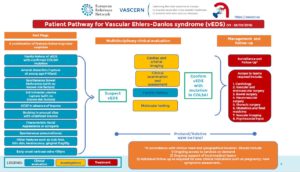
![]() Italian translation here
Italian translation here
Malfait F, Castori M, Francomano CA, Giunta C, Kosho T, Byers PH. The Ehlers-Danlos syndromes. Nat Rev Dis Primers. 2020 Jul 30;6(1):64. doi: 10.1038/s41572-020-0194-9. PMID: 32732924.
Diagnosis, natural history, and management in vascular Ehlers-Danlos syndrome. Byers PH, Belmont J, Black J, De Backer J, Frank M, Jeunemaitre X, Johnson D, Pepin M, Robert L, Sanders L, Wheeldon N. Am J Med Genet C Semin Med Genet. 2017 Mar;175(1):40-47. doi: 10.1002/ajmg.c.31553. Review. PMID: 28306228
Benchellal ZA, Huten N, Danquechin Dorval E, Podeur L, Rahili A, Lemeret S, De Muret A. [Abdominal emergencies in type IV ehlers-Danlos syndrome]. Gastroenterol Clin Biol. 1998 Mar;22(3):343-5. French
Wiesmann T, Castori M, Malfait F, Wulf H. Recommendations for anesthesia and perioperative management in patients with Ehlers-Danlos syndrome(s). Orphanet J Rare Dis. 2014 Jul 23;9:109. doi: 10.1186/s13023-014-0109-5. Review
Boodhwani M, Andelfinger G, Leipsic J, Lindsay T, McMurtry MS, Therrien J, Siu SC; Canadian Cardiovascular Society. Canadian Cardiovascular Society position statement on the management of thoracic aortic disease. Can J Cardiol. 2014 Jun;30(6):577-89.
Sobey G. Ehlers-Danlos syndrome: how to diagnose and when to perform genetic tests. Arch Dis Child. 2015 Jan;100(1):57-61
Bergqvist D, Björck M, Wanhainen A. Treatment of vascular Ehlers-Danlos syndrome: a systematic review. Ann Surg. 2013 Aug;258(2):257-61. doi: 10.1097/SLA.0b013e31829c7a59. Review
Chetty SP, Shaffer BL, Norton ME. Management of pregnancy in women with genetic disorders, Part 1: Disorders of the connective tissue, muscle, vascular, and skeletal systems.Obstet Gynecol Surv. 2011 Nov;66(11):699-709. Review
The MSA WG is currently working on the production of consensus statement documents on various topics such as in vitro fertilization (IVF) and pre-implantation genetic diagnosis (PGD) in vEDS.
All Vascular Ehlers Danlos Syndrome (vEDS) Factsheets in one document: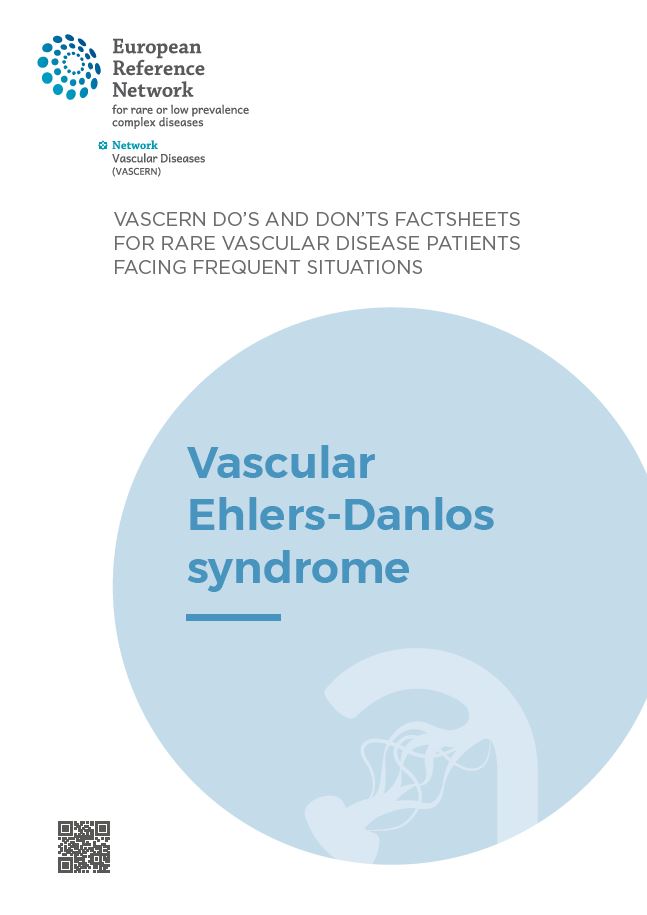
Individual factsheets for each topic:
Complications in vEDS
Peripheral arterial dissection
Pregnancy, Delivery and Postpartum care
Invasive investigations and treatment of common medical emergencies in vEDS
Antiplatelet agents and anticoagulants
The MSA-WG is currently working on defining their clinical outcome measures for vEDS
The MSA Registry project will consist of the adaptation of the already existing registry, the RADICO vEDS registry, which has been set up by our partner RADICO, is using RedCap, and has been used by HEGP Hôpital Européen Georges Pompidou in Paris, France. It is already up and running and used by reference and competence centres in France. The necessary modifications of this database to make it FAIR are now underway.
More information on the Registry WG page here.
- Year 1: Collaborative Publications
Diagnosis, natural history, and management in vascular Ehlers-Danlos syndrome.Byers PH, Belmont J, Black J, De Backer J, Frank M, Jeunemaitre X, Johnson D, Pepin M, Robert L, Sanders L, Wheeldon N.Am J Med Genet C Semin Med Genet. 2017 Mar;175(1):40-47. doi: 10.1002/ajmg.c.31553. Review. PMID: 28306228
The 2017 international classification of the Ehlers-Danlos syndromes.Malfait F, Francomano C, Byers P, Belmont J, Berglund B, Black J, Bloom L, Bowen JM, Brady AF, Burrows NP, Castori M, Cohen H, Colombi M, Demirdas S, De Backer J, De Paepe A, Fournel-Gigleux S, Frank M, Ghali N, Giunta C, Grahame R, Hakim A, Jeunemaitre X, Johnson D, Juul-Kristensen B, Kapferer-Seebacher I, Kazkaz H, Kosho T, Lavallee ME, Levy H, Mendoza-Londono R, Pepin M, Pope FM, Reinstein E, Robert L, Rohrbach M, Sanders L, Sobey GJ, Van Damme T, Vandersteen A, van Mourik C, Voermans N, Wheeldon N, Zschocke J, Tinkle B.Am J Med Genet C Semin Med Genet. 2017 Mar;175(1):8-26. doi: 10.1002/ajmg.c.31552.PMID: 28306229
Recognizing the tenascin-X deficient type of Ehlers-Danlos syndrome: a cross-sectional study in 17 patients.Demirdas S, Dulfer E, Robert L, Kempers M, van Beek D, Micha D, van Engelen BG, Hamel B, Schalkwijk J, Loeys B, Maugeri A, Voermans NC.Clin Genet. 2017 Mar;91(3):411-425. doi: 10.1111/cge.12853. Epub 2016 Nov 4.PMID: 27582382
- Year 2 : Collaborative Publications
Frequency of de novo variants and parental mosaicism in vascular Ehlers-Danlos syndrome. Legrand A, Devriese M, Dupuis-Girod S, Simian C, Venisse A, Mazzella JM, Auribault K, Adham S, Frank M, Albuisson J, Jeunemaitre X. Genet Med. 2018 Nov 26. doi: 10.1038/s41436-018-0356-2. [Epub ahead of print] PMID: 30474650
- Year 3-5 : Collaborative Publications
Vascular Ehlers-Danlos Syndrome: Long-Term Observational Study. Frank M, Adham S, Seigle S, Legrand A, Mirault T, Henneton P, Albuisson J, Denarié N, Mazzella JM, Mousseaux E, Messas E, Boutouyrie P, Jeunemaitre X. J Am Coll Cardiol. 2019 Apr 23;73(15):1948-1957. doi: 10.1016/j.jacc.2019.01.058. PMID: 30999998.
*Surveillance and monitoring in vascular Ehlers-Danlos syndrome in European Reference Network For Rare Vascular Diseases (VASCERN). van de Laar IMBH, Baas AF, De Backer J, Blankenstein JD, Dulfer E, Helderman-van den Enden ATJM, Houweling AC, Kempers MJ, Loeys B, Malfait F, Robert L, Tanteles G, Frank M. Eur J Med Genet. 2022 Sep;65(9):104557. doi: 10.1016/j.ejmg.2022.104557. Epub 2022 Jun 30. PMID: 35779834.
*Phenotype of COL3A1/COL5A2 deletion patients. Kempers MJ, Wessels M, Van Berendoncks A, van de Laar IM, de Leeuw N, Loeys B. Eur J Med Genet. 2022 Aug 11;65(10):104593. doi: 10.1016/j.ejmg.2022.104593. Epub ahead of print. PMID: 35964930.
* = VASCERN acknowledged






